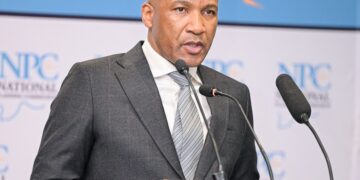- Tsaone Segaetsho
Civil Aviation Authority Botswana (CAAB) Chief Executive Officer, Dr Bao Rasebolai Mosinyi, has described the country’s aviation sector as having undergone a dramatic transformation from “moribund” to one of the best-performing state-owned enterprises.
Speaking in Maun this week at the national Aviation Pitso, convened by the Ministry of Transport and Public Works in collaboration with key stakeholders, Dr Mosinyi recalled how, in 2021 in the wake of Covid-19, Botswana’s civil aviation had been in “bad shape”, hampered by a demoralised workforce and an inability to meet international standards.
“But we have managed to turn around civil aviation entirely, as one of the better performing state-owned entities,” he said.
Underscoring the turnaround, Dr Mosinyi pointed to Botswana’s International Civil Aviation Organization (ICAO) safety effective implementation score of 85.78 per cent—well above the African average of 57 per cent and the global benchmark of 69 per cent. The achievement represents a significant leap from the 2021 score of 60.1 per cent, which had left Botswana trailing world standards.
Looking ahead, Dr Mosinyi committed that through the current CAAB strategic plan, the authority will raise safety and security standards to 95 per cent by 2029. “We are aiming high as we should, and we have not the slightest doubt that we will deliver on the commitment,” he said.
Progress is also evident in infrastructure and certification. Gaborone’s Sir Seretse Khama International Airport has already been certified, with Maun, Francistown’s PG Matante Airport, and Kasane soon to follow. “There are currently three airports that were certified in 2022, and Francistown’s certification is imminent,” Dr Mosinyi revealed.
Passenger volumes have rebounded sharply, rising from just over 106,000 in the 2020/21 financial year to 850,931 in the year just ended. Similarly, the number of privately-owned aerodromes increased from 79 in 2021 to 113, while registered aircraft rose from 195 to 232. Registered drones surged from 87 to 286 over the same period.
On his part, President Duma Boko called for momentum to be maintained. He confirmed that the civil aviation industry would be restructured, with Air Botswana separated as a standalone carrier, while CAAB itself would be unbundled into two autonomous entities: a civil aviation regulator and an airport management company.
Boko further emphasised that significant investment in aviation infrastructure was essential to harness Botswana’s strategic location at the heart of southern Africa. “One can go anywhere, in any direction, from Botswana. It is a strategic position that must be taken advantage of by the country,” he said.
As a first step, the government has earmarked improvements at Maun Airport, where the Pitso was hosted, signalling its commitment to using aviation as a catalyst for economic growth. The 2025/26 national budget has allocated P351 million towards aviation infrastructure projects, with the sector viewed as a vital enabler of tourism and trade.










